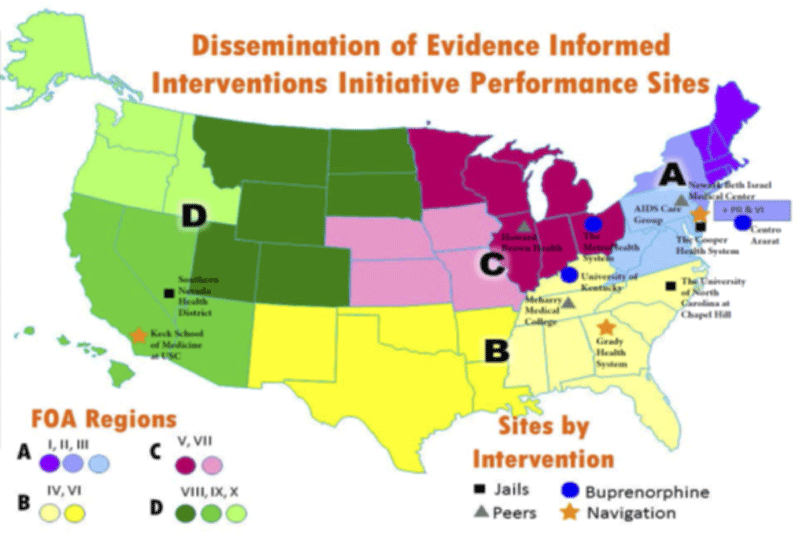Cross-posted from TargetHIVExit Disclaimer
Data. Data. Data.
Data have permeated this year's conference. The 2017 RWHAP Client-Level Data Report [PDF, 3.8MB] was released, documenting ever-improving viral suppression rates for RWHAP clients (video). Innovative uses of data in guiding program efforts was the focus of a plenary session. Various workshops and posters shared insights, such as regional adoption of CAREWareExit Disclaimer to support data integration efforts, and an entire Data Institute on the RSR.
Watch: Latest Data from the Ryan White HIV/AIDS Program HIV.gov Facebook Live
Beth Hurley of the DART TeamExit Disclaimer, a multi-party TA effort around for nearly a decade, explained how TA's focus "is moving from data completeness to data quality and using it for improvement processes." Something DART often shares with the field on the importance of data is: "Good quality data can help you improve quality of care, whereas poor quality data cannot. How can you know whether your clients are virally suppressed when you are missing half of your viral load data?"
Added Hurley, "the exciting things about sessions are people in the field collecting and reporting the data and using it to improve their practices." In one Data Institute session, a Ryan White provider discussed more complete reporting of racial and ethnic subgroups and timely identification of clients who have one or more break in service.
TargetHIV will soon post slides from the Data Institute and other sessions.
Applying Implementation Science
Dissemination of Evidence-Informed Interventions (DEII) is a multi-year HRSA project examining evidence-informed Care and Treatment Interventions under four subject areas. DEII is investigating these interventions at various sites. Alexis Marbach and other DEII team members presented several sessions at the 2018 Ryan White Conference. DEII has published four intervention manualsExit Disclaimer, available on the TargetHIV website.

Integrated Planning
IHAP is a HRSA TA projectExit Disclaimer that supports Part A planning in development of integrated HIV/AIDS plans for prevention and care. (IHAP is the Integrated HIV/AIDS Planning Technical Assistance Center.) RWHAP Part A and Part B jurisdictions have been doing HIV/AIDS planning for years, but the field is ever-evolving in terms of, for example, needs assessment methodologies, planning body prevention/care integration, and the focus of planning.
The role of IHAP is, often, to "fill a facilitation role; bringing stakeholders together from within a jurisdiction or across jurisdictions," said Juli Powers, IHAP TAC Technical Assistance Coordinator. "We provide structures to identify challenges and develop approaches to respond those challenges in a way that enhances the ability of the jurisdiction to move forward with an integrated plan." (Integrated planning was discussed in an evening listening session, which provided HRSA with feedback on pending HRSA guidance on integrated plans.) Learn more about IHAP resources featuring the Integrated HIV Prevention and Care Plan Online Resource GuideExit Disclaimer and Exemplary Integrated HIV Prevention and Care Plan SectionsExit Disclaimer. Need help with integrated planning? Submit the IHAP questionnaireExit Disclaimer on your jurisdiction's needs.

Health Insurance: Picking and Maintaining Coverage
HRSA's ACE TA CenterExit Disclaimer was part of a December 12 workshop discussion on considerations for selecting and maintaining health insurance coverage—from plan selection to dealing with co-pay costs. Mira Levinson and colleagues presented on the importance of health insurance literacy, challenges around picking and using coverage, and ACE TA Center health literacy resources available to RWHAP agencies.
NASTAD's Amy Killelea, JD, outlined her focus on "policy considerations for RWHAP recipients and clients," including policy "actions that could potentially threaten affordability of coverage and short-term plans, particularly those with pre-existing condition" coverage limitations. Said Killelea, RWHAP recipients need to make sure their clients "know what they are signing up for and sign up for the right plan."
Killelea said that the 2019 open enrollment period "didn't see the huge increase [in costs] we saw in 2018" and that the "Ryan White enrollment workforce did phenomenal work" in the face of greatly reduced funding for enrollment support at the federal level. (Session: Maintaining Coverage throughout the Year: Tips & Strategies to Navigate Health Insurance Challenges.)

Poster: CQM and Barriers to Care for Women
A Ft. Lauderdale/Broward County Clinical Quality Management (CQM) Program focused on a group of virally unsuppressed women in the Ryan White Part A Program was outlined in the poster Implementing Targeted Interventions Using Identified Barriers to Care for WomenExit Disclaimer [PDF, 2.3MB]. Contact Lauren Gold to learn more.
